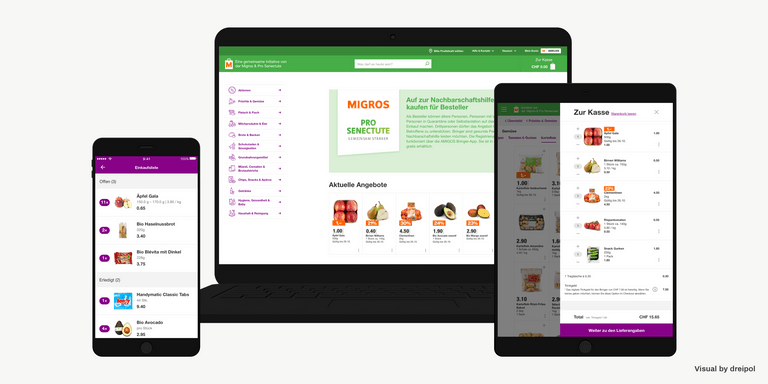AMIGOS was designed in collaboration with Liip and dreipol. A web platform for customers and a practical app for bringers were developed. The complexity of the platform has brought with it various implementation challenges. A large number of technical dependencies existed in the individual technologies and software.
Cooperation between two agencies
Both agencies and the client are able to look back on a successful collaboration. Colin Frei, former product owner at Liip, speaks of an inspiring cooperation and can imagine working with dreipol again in the future. Thanks to agile project methods – requirements were clarified and specified step by step – and good communication between the three parties, the product was able to grow iteratively and thus continuously improve in terms of content, concept and technology. The division of tasks was important in this collaborative creation of the platform: dreipol developed the front end of the online shop and app and was responsible for UX and design. Liip took care of the back end and the administration interface as well as the link with the Migros API.
Not a disruption, more an enhancement
Customers who have never bought groceries online are now using AMIGOS. The platform is fast, ordering is personal and there are no minimum quantities. The usability makes ordering easy. The speed of delivery makes it convenient. The experience is both everyday and new.
Reduction to the essentials
AMIGOS has several helpful and additional features. There is an online shop and a bringer app. In visual terms, however, AMIGOS has been reduced down to the essentials so that users are not unnecessarily distracted.
Security
Having shopping delivered to your home by strangers requires a lot of trust. The AMIGOS online shop and the bringer app are therefore subject to and comply with the highest security standards. For example, all bringers are manually verified via image verification. The bringers are also required by the Stripe payment system to confirm all relevant personal data. A feedback function also provides the option to rate the customer and the bringer, which creates social proof. If that is not enough, you have the option of blocking a bringer. If, for example, a customer does not want their immediate neighbour to do their shopping, they can enter this directly in their profile.
Regular usability tests
The idea is that AMIGOS is intuitively understood by users. Extensive tests were carried out internally at Migros. AMIGOS users have a great influence over the future of AMIGOS. Feedback can be transmitted directly in the web-shop and also in the app.
Accessibility
The web platform has been implemented in a barrier-free way so that everyone can place orders and have shopping delivered easily and conveniently. AMIGOS meets the most common accessibility criteria. These were a requirement from the very beginning. The Accessibility Developer Guide was also consulted in the implementation. This guide was written in collaboration with various web agencies to make the web more accessible. The main focus was on people with visual impairments so that they too are able to shop without difficulty. The online shop displays content in a minimum size. Colour contrasts and colour intensities are strong enough so that even people who do not recognise colours well are able to read the content. The language is kept simple and alt texts support the images.
Many users – no performance restrictions
The platform benefited from a high media presence shortly after the first go-live. As a result, the number of users shot up. Even before the go-live, extensive load tests were carried out to ensure that the platform would be able to handle the number of users with no loss of performance. This was repeated and carried out in different variants. This ensured flawless performance right from the start.
New front end and technical gadgets
The clean separation of front end and back end was identified as the main focus in the technology implementation. Building on existing systems (Migros Login, Migros Product Data API), we built the order handling. Dreipol built a specific front end, also coupled with the product data API. Thanks to the product data API, which was already developed for Migros, we were able to build the order handling easily. We relied on our own development with the Symfony framework, as the technical process for an order is very different from a usual online shopping order. The Symfony workflow engine enabled all steps of the ordering and matching process to be mapped. While selecting products to place in the shopping basket is standard, the subsequent checkout process is unusual. As the exact prices are not known in advance, an amount plus some reserve is pre-authorised on the credit card. The customer chooses a delivery time slot. Potential bringers are notified and can decide whether they want to carry out the order. The order is only confirmed when a bringer accepts the order. Now the bringer goes shopping to a Migros branch and scans the receipt after paying. The customer must confirm the delivery once they have received it. The amount pre-authorised on the credit card is then compared with the fixed final amount and debited accordingly. The transfer is then made to the bringer. The user-specific coupon/discount logic was also built in here. We have integrated the payment gateway Stripe for credit card handling and repayment to the bringer.

